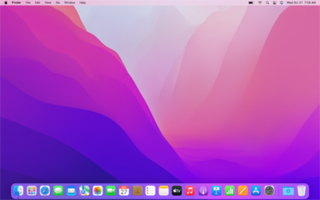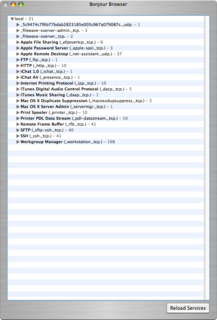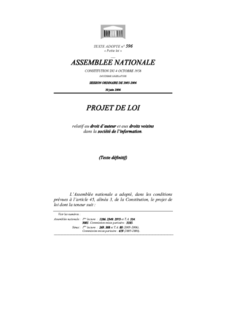
macOS is a Unix operating system developed and marketed by Apple Inc. since 2001. It is the primary operating system for Apple's Mac computers. Within the market of desktop and laptop computers it is the second most widely used desktop OS, after Microsoft Windows and ahead of ChromeOS.

An operating system (OS) is system software that manages computer hardware, software resources, and provides common services for computer programs.

Bonjour is Apple's implementation of zero-configuration networking (zeroconf), a group of technologies that includes service discovery, address assignment, and hostname resolution. Bonjour locates devices such as printers, other computers, and the services that those devices offer on a local network using multicast Domain Name System (mDNS) service records.

The Apple IIGS, the fifth and most powerful of the Apple II family, is a 16-bit personal computer produced by Apple Computer. While featuring the Macintosh look and feel, and resolution and color similar to the Amiga and Atari ST, it remains compatible with earlier Apple II models. The "GS" in the name stands for "Graphics and Sound," referring to its enhanced multimedia hardware, especially its state-of-the-art audio.

AppleWorks is an integrated office suite containing a word processor, database, and spreadsheet. It was developed by Rupert Lissner for Apple Computer, originally for the Apple II platform and launched in 1984, and was later reworked for the Macintosh platform.
Claris International Inc., formerly FileMaker Inc., is a computer software development company formed as a subsidiary company of Apple Computer in 1987. It was given the source code and copyrights to several programs that were owned by Apple, notably MacWrite and MacPaint, in order to separate Apple's application software activities from its hardware and operating systems activities.
An online service provider (OSP) can, for example, be an Internet service provider, an email provider, a news provider (press), an entertainment provider, a search engine, an e-commerce site, an online banking site, a health site, an official government site, social media, a wiki, or a Usenet newsgroup.
Apple Developer is Apple Inc.'s website for software development tools, application programming interfaces (APIs), and technical resources. It contains resources to help software developers write software for the macOS, iOS, iPadOS, watchOS, and tvOS platforms.

eWorld was an online service operated by Apple Inc. between June 1994 and March 1996. The services included email, news, software installs and a bulletin board system. Users of eWorld were often referred to as "ePeople."
HCL Sametime Premium is a client–server application and middleware platform that provides real-time, unified communications and collaboration for enterprises. Those capabilities include presence information, enterprise instant messaging, web conferencing, community collaboration, and telephony capabilities and integration. Currently it is developed and sold by HCL Software, a division of Indian company HCL Technologies, until 2019 by the Lotus Software division of IBM.

A users' group is a type of club focused on the use of a particular technology, usually computer-related.
Mobile app development is the act or process by which a mobile app is developed for mobile devices, such as personal digital assistants, enterprise digital assistants or mobile phones. These software applications are designed to run on mobile devices, such as a smartphone or tablet computer. These applications can be pre-installed on phones during manufacturing platforms, or delivered as web applications using server-side or client-side processing to provide an "application-like" experience within a web browser. Application software developers also must consider a long array of screen sizes, hardware specifications, and configurations because of intense competition in mobile software and changes within each of the platforms. Mobile app development has been steadily growing, in revenues and jobs created. A 2013 analyst report estimates there are 529,000 direct app economy jobs within the EU then 28 members, 60 percent of which are mobile app developers.

Loi DADVSI is the abbreviation of the French Loi relative au droit d’auteur et aux droits voisins dans la société de l’information. It is a bill reforming French copyright law, mostly in order to implement the 2001 Information Society Directive, which in turn implements a 1996 WIPO treaty.
A Macintosh User Group (MUG) is a users' group of people who use Macintosh computers made by Apple Inc. or other manufacturers and who use the Apple Macintosh operating system (OS). These groups are primarily locally situated and meet regularly to discuss Macintosh computers, the Mac OS, software and peripherals that work with these computers. Some groups focus on the older versions of Mac OS, up to Mac OS 9, but the majority now focus on the current version of Mac OS, Mac OS X.

The Berkeley Macintosh Users Group, or more commonly "BMUG", was the largest Macintosh User Group. It was founded in September 1984 by a group of UC Berkeley students including Reese Jones and Raines Cohen as a focal-point for the nascent Apple Macintosh user community. With more than 13,000 members, or "BMUGgers" at its peak in 1993, the group was the largest, and generally understood to be the most important, Macintosh users group. A few of the notable members include John "Captain Crunch" Draper, the Sultan of Brunei Hassanal Bolkiah, notorious murderer Enrique Zambrano, early hacker-chaser Cliff Stoll, Inktomi founder Eric Brewer, and may prominent computing journalists like John Dvorak, Ilene Hoffman, Leo Laporte and Adam Engst. An example of the group's omnipresent blue-floppy-disk lapel pin is held in the Smithsonian Institution's American History collection. BMUG's history and activities were closely linked with the MacWorld Expo meetings, traditionally held in San Francisco each January and Boston each August.
Garden Networks is a not-for-profit organization registered in Canada, that specializes in providing Internet anti-censorship/Internet privacy products for free. The full name of Garden Networks is Garden Networks for Freedom of Information.
MobileMe is a discontinued subscription-based collection of online services and software offered by Apple Inc. All services were gradually transitioned to and eventually replaced by the free iCloud, and MobileMe ceased on June 30, 2012, with transfers to iCloud being available until July 31, 2012, or data being available for download until that date, when the site finally closed completely. On that date all data was deleted, and email addresses of accounts not transferred to iCloud were marked as unused.
Proprietary software, also known as non-free software or closed-source software, is computer software for which the software's publisher or another person reserves some licensing rights to use, modify, share modifications, or share the software, restricting user freedom with the software they lease. It is the opposite of open-source or free software. Non-free software sometimes includes patent rights.

Splashtop is a family of remote-desktop software and remote support software, developed by Splashtop Inc. Splashtop enables users to remotely access or remotely support computers from desktop and mobile devices. Splashtop enables remote computer access for businesses, IT support and help desks, MSPs, and educational institutions.









